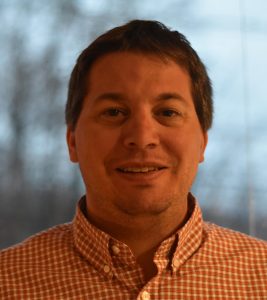 Speaker: Andrew Bolstad, Technical Staff Member at MIT Lincoln Laboratory in the Advanced RF Technology and Systems Group
Speaker: Andrew Bolstad, Technical Staff Member at MIT Lincoln Laboratory in the Advanced RF Technology and Systems Group
Title: Tools to Succeed in a Contested Spectrum
Abstract: The electromagnetic spectrum is becoming a contested environment in both civilian applications and warfare. With more and more wireless devices coming online, the need to efficiently share the spectrum is increasing. The same technology advances that have driven the proliferation of cheap wireless devices has eroded the cost barrier for RF systems with military applications. This talk will cover two technologies which aim to address the contested spectrum. First, nonlinear compensation techniques improve the linearity of both transmitters and receivers. On the transmit side, digital pre-distortion (DPD) allows power amplifiers to run near saturation, where they are most efficient, without introducing nonlinear distortion in band or in neighboring channels. On the receive side, nonlinear equalization (NLEq) increases receiver dynamic range, allowing detection of very weak signals. DPD and NLEq both require power efficient digital implementations to maintain the efficiency of the overall system. The sparse polynomial equalization (SPEq) approach finds a sparse set of coefficients which best models a nonlinear system of interest. Analysis of the approach as well as results from a low power test receiver will be presented. Second, succeeding in a contested spectrum requires detecting and localizing emissions, often over very wide bandwidths. The array-based compressed sensing receiver architecture (ACRA) leverages the sparse fast Fourier transform (SFFT) algorithm to determine the frequency and direction of arrival of signals over extremely wide bandwidths, as well as to reconstruct detected signals. Simulations of the approach and results from the 18-50 GHz ACRA testbed will be shown.
Bio: Andrew K. Bolstad is a technical staff member at MIT Lincoln Laboratory in the Advanced RF Technology and Systems Group, where he works on signal processing problems related to spectrum operations. His primary research interests include sparse signal processing and digital nonlinear compensation. Andrew recently led two research efforts implementing the sparse fast Fourier transform (SFFT). The Array-based Compressed sensing Receiver Architecture (ACRA) program demonstrated the use of the SFFT in an extremely wideband digital receiver array. The Next Generation Embedded Processor program developed an ASIC capable of implementing both sparse and standard (i.e., dense) FFTs depending on the connections of the top metal layers, work which led to a 2015 best paper award in the poster division at the Government Microcircuit Applications and Critical Technology Conference (GOMACTech). Previously, Andrew led the Pseudo-Random Optical Sampling-Enhanced ADCs (PROSE) study investigating compressed sensing of sparse RF signals using low timing jitter optics and organized a laboratory-wide study group focused on compressed sensing and sparse signal processing. His nonlinear signal processing work spans transmitter predistortion and receiver equalization, including development of the Sparse Polynomial Equalizer (SPEq) to achieve over 90 dB SFDR in a very low-power receiver. Andrew earned a B.S. degree from Iowa State University followed by M.S. and Ph. D. degrees from the University of Wisconsin-Madison, all in electrical engineering. His dissertation research focused on applying compressed sensing ideas to model signals produced in the human brain for localization and connectivity estimation.